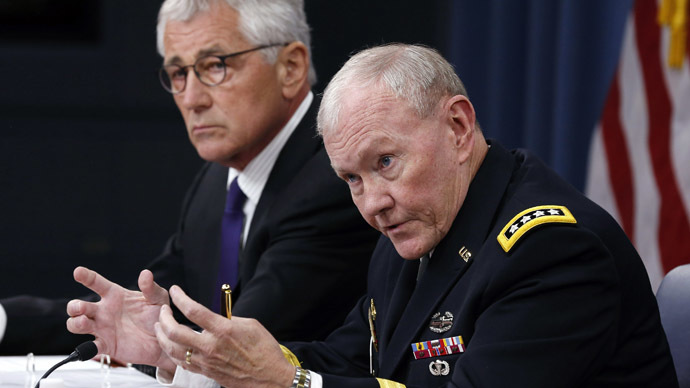Pentagon officials provided an update on Friday concerning the campaign being waged against militants from the so-called Islamic State and said the operation remains a ways from being over.
In a press conference from the United States military’s headquarters near Washington, DC on Friday, Defense Secretary Chuck Hagel and Joint Chiefs of Staff Chairman Gen. Martin Dempsey said the US-led campaign against the group also known as ISIS, or ISIL is still in its infancy, but continues to garner support from the international community. In order to succeed, however, an infantry of up to 15,000 fighters may need to be trained to take on the extremists.
The US began launching attacks at ISIS strongholds in Syria for the first time this week in addition to targets in Iraq, and Gen. Dempsey said at Friday’s presser that those efforts may have already begun to pay off.
This week’s strikes supplied by the US military and a coalition of five Arab nation partners disrupted the Islamic State’s command and control and logistics ability, Dempsey said, and has helped deny the militants the freedom of movement in the area following a months-long campaign that already allowed ISIS to take over towns across the region.

Sec. Hagel said that the Pentagon has so far launched 43 airstrikes in Syria and, combined with ongoing efforts in Iraq, will continue to strike targets as the international community comes together to fight ISIS as well.
In the few days since the US began striking Syria, Hagel said, “the governments of Belgium, Denmark and the Netherlands have announced their intention to participate” in the American-led campaign against ISIS, with the UK’s parliament voting in favor of doing as much only moments before Friday’s briefing began at the Pentagon.
According to the US government, more than 40 nations — including Syria’s Middle East neighbors of Qatar, the United Arab Emirates, Saud Arabia, Bahrain and Jordan — have so far pledged support to the anti-ISIS campaign. As the US continues to insist that American forces will avoid taking on a combat role on the ground in Iraq or Syria, however, the Pentagon officials acknowledged that a properly trained army must be assembled in order to conquer the Islamic State since an aerial campaign alone can’t solve the conflict.
“No one is under any illusion — under any illusions — that airstrikes alone will destroy ISIL,” Hagel told reporters. “They are one element of our broader, comprehensive campaign against ISISL.”

On his part, Dempsey said that neither an air assault nor a military campaign will truly win the war against the group, and that troops must be trained to fight ISIS on the ground while the US and other nations take a broader approach towards eradicating the extremists.
The US Central Command, Dempsey said, is actively working with "Iraqi military leaders to ensure that what occurs on the ground is their campaign, not our campaign,” and that the Pentagon continues to talk with leadership in neighboring Turkey “about their different ways to contribute to the coalition.”
“Yes, there has to be a ground component to the campaign against ISIL in Syria,” the Joint Chiefs chairman said later during the briefing, adding that earlier figures pertaining to a group of 5,000 prospective US-trained forces may be but a fraction of what is truly required. Instead, he said, upwards of 15,000 combatants may need to be trained in order to take on the ever growing Islamic State.
“This will not be an easy or brief effort,” Hagel said. “We are at the beginning not the end” of the administration’s effort to degrade and destroy the Islamic State.
Hagel and Dempsey’s remarks came two days after US President Barack Obama appealed before an international audience to assist in America’s anti-ISIS campaign during an address at the United Nations headquarters in New York City.
“No God condones this terror,” he said of the group. “No grievance justifies these actions. There can be no reasoning – no negotiation – with this brand of evil. The only language understood by killers like this is the language of force. So the United States of America will work with a broad coalition to dismantle this network of death.”
On Friday, Sec. Hagel said that “there has been no coordination, nor will there be, with the Assad regime,” suggesting the Pentagon will continue to launch strikes in Syria without the permission of that country’s president. “Nothing has changed about our position that has shifted our approach to Assad and his regime because President Assad has lost all legitimacy to govern,” he said.

